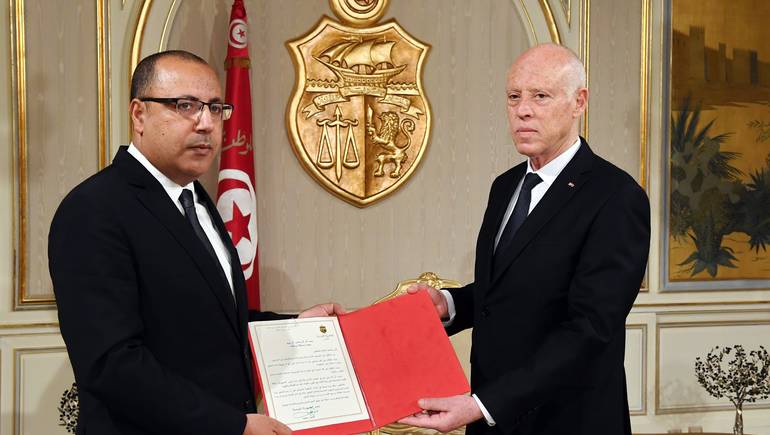
On 25 July 2020, Tunisian President Kais Saied tapped Hichem Mechichi to form a new government, following the resignation of Prime Minister Elyas Fakhfakh, whose government lasted a brief, though stormy, five months marred by allegations of conflict of interest and a vote of no-confidence. A former interior minister and advisor to the president, Mechichi faces the daunting task of navigating a complex, deeply polarised, and fragmented political landscape to form a durable government that can begin to address the severe social and economic problems facing Tunisia, now exacerbated by the coronavirus epidemic. Failure would not only spell early elections, but could also undermine Tunisia’s democratic experiment.
The roots of the current political deadlock lay in the outcome of the 2019 elections. The presidential race saw the victory of an outsider candidate with no base or experience in the conventional political order, not beholden or bound to any party or constituency, or even clear ideology. Suspicious of party politics, the president has proposed restructuring the political order around decentralised local assemblies. This, combined with his unilateral governing style, has not endeared him to many parliamentarians and politicians. On the legislative side, the elections ushered in an extremely fragmented, diverse parliament. The biggest winner, Ennahda, took less than a quarter of parliamentary seats, and several smaller parties entered with just a handful. The result has been a factious political landscape that is not amenable to consensus politics or stable coalitions. In many cases, the president has seemed only too happy to let the parliamentary deadlock and disputes fester, perhaps reasoning that a dysfunctional parliament would erode faith in the existing system, providing additional justification for his proposed new order and shoring up his own legitimacy.
Mechichi was an unexpected pick—something of an outsider, like the president. In naming him the president rejected the favoured candidate of a majority of parliament, Mohamed Fadel Abdel Kafi. Thanks to that support, Abdel Kafi would have been well positioned to form a broad-based government and build the trust and consensus necessary to confront the country’s socioeconomic problems.
Mechichi has one month to form his government, and it remains unclear whether he will attempt to cobble together a party coalition or bring in independent figures. His best chance of success is to exploit his partisan independence to maintain an equal distance from all the conflicting parties while trying to build a broad political consensus. But he will likely not have an easy time, particularly when dealing with Ennahda and the Heart of Tunisia, the two parties that brought the no-confidence vote against Fakhfakh and combined have more than 100 seats in the assembly. Their support will be key, but even if he gains it, he will still not have a clear parliamentary majority and the two parties could revoke subsequently their support. The backing of the two other major parties, the Democratic Current and the People’s Movement, is more certain, but is conditional on those two parties maintaining their own united front, which is less certain in the long term. In short, even if Mechichi’s government receives a vote of confidence, there is still the possibility of renewed deadlock a few months down the road, but this time the consequences may be more severe, as economic conditions are expected to worsen due to the impact of the coronavirus.
More important are the possible secondary effects of the Mechichi choice on the trajectory of democracy and the role of political parties in Tunisia. Firstly, the political crisis in Tunisia cannot be understand, in its causes or effects, without looking at the intersections between domestic and foreign agendas in the wider Arab world. In particular, the conflict in Libya has had and will have an important impact on the Tunisian political landscape, as domestic parties are increasingly lining up behind various competing forces in Libya and the so-called counterrevolutionary Arab bloc would like nothing more than to see Tunisia succumb to the fate of the rest of the Arab Spring states.
Secondly, by choosing Mechichi, President Saied has laid the groundwork to allow him to exercise greater executive power and perhaps impose his vision of a differently structured political order. If Mechichi populates his government with nonpartisan figures, it will give added momentum to this trend and will further fuel tensions between the legislature and the executive. In that case, the major parliamentary players will need to act quickly to confirm the constitutional court and amend the election law, in order to retake the initiative from the president and breathe new life into the democratic process.
*This is a summary of a policy brief originally written in Arabic, available here: https://studies.aljazeera.net/ar/article/4745.